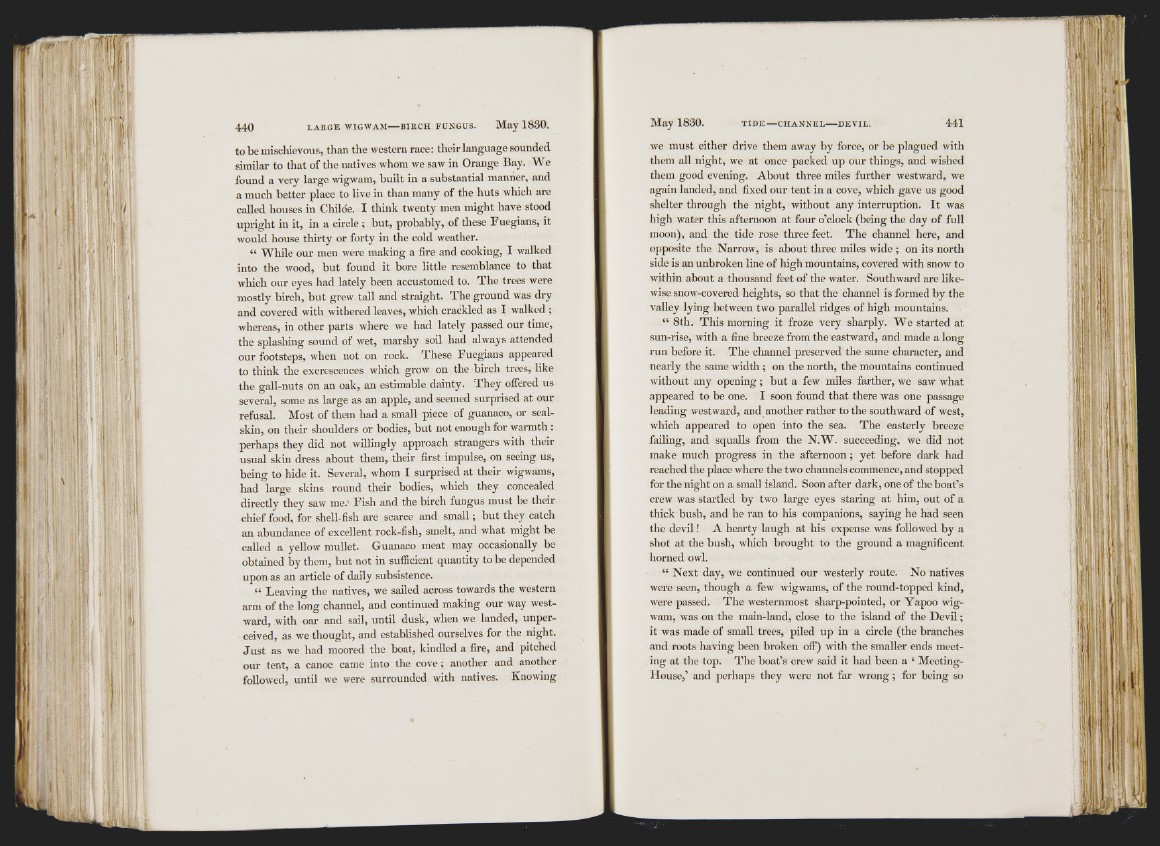
f ■ 'M ■; t
L j ! I {
to
to be mischievous, than the western race: their language sounded
similar to that of the natives whom we saw in Orange Bay. We
found a very large wigwam, built in a substantial manner, and
a much better place to live in than many of the huts which are
called houses in Chiloe. I think twenty men might have stood
upright in it, in a circle ; hut, probably, of these Fuegians, it
would house thirty or forty in the cold weather.
“ While our men were making a fire and cooking, I walked
into the wood, but found it bore little resemblance to that
which our eyes had lately been accustomed to. The trees were
mostly birch, but grew tall and straight. The ground was dry
and covered with withered leaves, which crackled as I walked ;
whereas, in other parts where we had lately passed our time,
the splashing sound of wet, marshy soil had always attended
our footsteps, when not on rock. These Fuegians appeared
to think the excrescences which grow on the birch trees, like
the gall-nuts on an oak, an estimable dainty. They offered us
several, some as large as an apple, and seemed surprised at our
refusal. Most of them had a small piece of guanaco, or sealskin,
on their shoulders or bodies, but not enough for warmth :
perhaps they did not wilhngly approach strangers with their
usual skin dress about them, their first impulse, on seeing us,
being to hide it. Several, whom I surprised at their wigwams,
had large skins round their bodies, which they concealed
directly they saw me.' Fish and the birch fungus must be their
chief food, for shell-fish are scarce and small; but they catch
an abundance of excellent rock-fish, smelt, and what might be
called a yellow mullet. Guanaco meat may occasionally be
obtained by them, but not in sufficient quantity to be depended
upon as an article of daily subsistence.
“ Leaving the natives, we sailed across towards the western
arm of the long channel, and continued making our way westward,
with oar and sail, until dusk, when we landed, unperceived,
as we thought, and established ourselves for the night.
Just as we had moored the boat, kindled a fire, and pitched
our tent, a canoe came into the cove; another and another
followed, until we were surrounded with natives. Knowing
we must either drive them away by force, or be plagued with
them all night, we at once packed up our things, and wished
them good evening. About three miles further westward, we
again landed, and fixed our tent in a cove, which gave us good
shelter through the night, without any interruption. It was
high water this afternoon at four o’clock (being the day of full
moon), and the tide rose three feet. The channel here, and
opposite the Narrow, is about three miles wide; on its north
side is an unbroken line of high mountains, covered with snow to
within about a thousand feet of the water. Southward are likewise
snow-covered heights, so that the channel is formed by the
valley lying between two parallel ridges of high mountains.
“ 8th. This morning it froze very sharply. We started at
sun-rise, with a fine breeze from the eastward, and made a long
run before it. The cliannel preserved the same character, and
nearly the same width ; on the north, the mountains continued
without any opening; but a few miles farther, we saw what
appeared to be one. I soon found that there was one passage
leading westward, and another rather to the southward of west,
which appeared to open into the sea. The easterly breeze
failing, and squalls from the N.W. succeeding, we did not
make much progress in the afternoon; yet before dark had
reached the place where the two channels commence, and stopped
for the night on a small island. Soon after dark, one of the boat’s
crew was startled by two large eyes staring at him, out of a
thick bush, and he ran to his companions, saying he had seen
the devil! A hearty laugh at his expense was followed by a
shot at the bush, which brought to the ground a magnificent
horned owl.
“ Next day, we continued our westerly route. No natives
were seen, though a few wigwams, of the round-topped kind,
were passed. The westernmost sharp-pointed, or Yapoo wigwam,
was on the main-land, close to the island of the Devil;
it was made of small trees, piled up in a circle (the branches
and roots having been broken oif) with the smaller ends meeting
at the top. The boat’s crew said it had been a ‘ Meeting-
House,’ and perhaps they were not far wrong; for being so